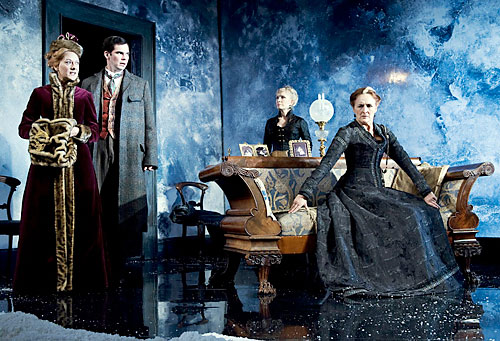For a play that stars some of the best stage actors working today — as well as Snape from the “Harry Potter” movies — the true star may be the set.
In Abbey Theatre’s production of Ibsen’s “John Gabriel Borkman,” running now at the Brooklyn Academy of Music, white snow surrounds a house that is already chilled from within. It threatens to creep in, occasionally even getting swept up in the ladies’ long skirts. It’s a perfect metaphor for the inhabitants’ cold personalities, done in by scandal, deceit and betrayal.
“Borkman,” though written more than 100 years ago and presented here in a new version by playwright Frank McGuinness, is a story that is all too familiar: a once-prominent family is brought under by a financial scandal — in this case, embezzlement. Some 16 years after the fact, the klan is still reeling over the resulting shame and poverty.
Alan Rickman portrays the embattled Borkman, a man who spends his days pacing aimlessly upstairs. He’s estranged from his wife, Gilhund (Fiona Shaw), even though they live in the same house. She spends her days downstairs in the drawing room, listening to his pacing.
Enter into this unhappy scene Ella Rentheim (Lindsay Duncan), Gilhund’s twin sister, who first was Borkman’s lover, until his greed got in the way. She’s ill (the effects of a broken heart, we’re told), and wants her twentysomething nephew, Erhart (Marty Rea), to carry on her name. That doesn’t sit well with Gilhund, who sees her son as the only hope for the disgraced family to make Borkman a respected name again.
The only truly happy person is Erhart, and he wants to keep it that way, so he flees. You can’t blame the kid — these are people who wallow in their misery. They’re all dressed in black, as if perpetually at their own funeral, and they wear their despair like a badge. Gilhund at one point even spits out the word “happiness” as if it’s a disease, in a deft delivery from Shaw that earns laughs.
Indeed, for a play about miserable people, “Borkman” can be, at times, a good time, thanks to some witty performances by the cast. It’s also due, though, to the melodramatic nature of the plot; even the most serious scenes — a heated moment where Gilhund strikes her son comes to mind — elicited laughs from the audience.
But such “comic relief” isn’t enough to overcome the intensely overwrought remainder of the show, one in which it is not out of place for a woman to literally collapse onto the floor in grief, and say, “You killed the love in me.”
I enjoyed the quiet moments best, rather than the tour-de-force ones — Shaw with a chip on her shoulder and a smirk on her face, ready with a quick one-liner; Duncan when she’s dignified, not hysterical.
Of the men, John Kavanagh’s portrayal of Vilhelm Foldal, an old friend of Borkman’s, was excellent, giving a very natural, warm performance that was, alas, too brief. Rickman, surely the big draw for theater-goers here, sheds his usually formidable screen presence and effectively turns into a shell of a man on stage, lost and weak, though occasionally a bit of a mumbler.
And then, of course, there’s the elegant, sparse set by Tom Pye, paired with the precise lighting by Jean Kalman. During one particularly striking scene, Borkman and Ella leave the debatable warmth of the house and go out into the middle of a blizzard. Snow swirls around the stage — it’s snowing! — and the darkness of the night envelopes them. It’s a deep, deep darkness that seems to go on infinitely, even though the back of the stage couldn’t be more than 20 feet away. It just goes to show that even the simplest moments can be the most transporting.
“John Gabriel Borkman” at the BAM Harvey [651 Fulton St. between Rockwell and Ashland places in Fort Greene, (718) 636-4100], through Feb. 6. Tickets $25-$95. For info, visit www.bam.org.

























